new posts in all blogs
Viewing: Blog Posts Tagged with: sky village, Most Recent at Top [Help]
Results 1 - 17 of 17
How to use this Page
You are viewing the most recent posts tagged with the words: sky village in the JacketFlap blog reader. What is a tag? Think of a tag as a keyword or category label. Tags can both help you find posts on JacketFlap.com as well as provide an easy way for you to "remember" and classify posts for later recall. Try adding a tag yourself by clicking "Add a tag" below a post's header. Scroll down through the list of Recent Posts in the left column and click on a post title that sounds interesting. You can view all posts from a specific blog by clicking the Blog name in the right column, or you can click a 'More Posts from this Blog' link in any individual post.
This is something very cool.
The Sky Village was nominated for the Wake County Public LIbraries Eva Perry Mock Newbery Award (that’s a mouthful).
And then it was shortlisted.
Book clubs like this are a real inspiration. Here’s a bit about the book club:
The Eva Perry Mock Newbery Club is a group of about 25 6th-9th graders who read newly written books, some of them donated to the club as advance reader copies. We read books from April through January, listing and discussing our favorites in our blog, and nominating the very best for our own Mock Newbery Awards. We select our winners just before the official winners are announced by the ALA each year. We have also traveled to ALA conferences and been visited by local authors.
Our club was started in 1998 by Teresa Young Brantley, an official member of the 1999 Newbery committee that chose Holes by Louis Sachar as its winner








.jpeg?picon=1166)
By:
Chris Rettstatt,
on 4/19/2008
Blog:
Chris Rettstatt
(
Login to Add to MyJacketFlap)
JacketFlap tags:
sky village,
philip reeve,
young adult literature,
fantasy,
children's literature,
kidlitosphere,
kaimira,
hungry city chronicles,
laura baas,
review,
Add a tag
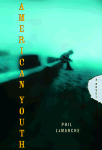
Interested in books that could help YAs make the jump to adult mainstream literature? You might want to take a look at at American Youth by Phil LaMarche.
Setting, both in time and place, is extremely important in American Youth. Teddy LeClare's family is part of a rural, hunting culture that feels itself being pushed out in the '80s by newcomers who are creating and moving into developments on property the locals once hunted and roamed on. Teddy's mother definitely feels that these people are different, not like her and her family. Complicating matters is an economic downturn that's left developments unfinished and meant that a lot of people have had to put their houses up for sale--for what good that does them.
At the beginning of the book, Teddy, who is about to start ninth grade at a regional high school, invites a couple of these new kids into his home. When these brothers find his place boring, he agrees to show them his gun, one of a number in the LeClare house, and even loads it when they ask him to. Teddy has been brought up by gun people. He knows never to point a gun, loaded or unloaded, at a human being. (I remember learning that, too.) But these new kids weren't brought up around guns. And when Teddy steps out of the room, one brother points the gun at the other and kills him.
This is a tragedy, of course. What elevates it to a nightmare is Mrs. LeClare's insistence that her son Teddy not tell anyone he loaded the gun. In the world in which she grew up, her only child did nothing wrong. But in the world that is being imposed on her by these newcomers, she fears the family will be held responsible for the accident and made to pay dearly.
The misery and guilt Teddy feels is compounded by the guilt over the lie and worry over whether or not he'll be caught, since his story conflicts with that of the surviving brother. He's ripe for the picking when a gang calling itself American Youth approaches him. Claiming to support "American" values and the rights of the individual over federal intrusion, the members are sympathetic to Teddy's plight.
At first.
One of the strengths of this book is that it isn't an anti-gun rant. It's not an apology for gun use, either. The gun owners are not romanticized, certainly, but treated with respect. This is a portrayal of a culture, a slice of life.
In terms of YA readers, American Youth is both familiar and unique. Most readers will be able to identify with the teenager struggling to get along, the clique (in this case a gang), and the problems with parents. What's unique is the setting, the culture within which the story takes place. I don't think there are a lot of YA books that go much beyond YA culture. This adult book does. It places what's going on in this poor boy's life within the bigger society. That may be what makes it an adult book instead of YA.
American Youth is well written, but not in a flashy way. There is no wise-ass YA voice, which can become very cliched when it isn't well done. There definitely is no humor. This is a dark tale about a dark period in a young person's life.
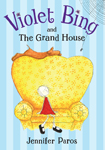
I'm afraid I'm very much like Violet Odelia Bing in Violet Bing and The Grand House by Jennifer Paros. My mind is made up about a great many things. I don't care for kids' books about children with funny names like Violet Odelia Bing. As a general rule, I'm not fond of eccentric great aunts (or uncles, for that matter). I think their freaky old houses have been done to death, too. And third-person narrators who speak directly to readers set my teeth on edge.
And, yet, I like Violet Bing. I even like the Grand House she visits.
I think what makes Violet so attractive to me is that she isn't a cute, funny kid. She is an anxious child. She is "against Surprises and Things I Don't Know." She has an objection to every new experience. Such children aren't going to fall into line easily or quickly or--let's be honest, here--maybe even at all. They certainly aren't going to learn a sweet little lesson from an adult, as so many children in books for younger readers do.
Violet refuses to go on vacation with the rest of the family and has to accept staying with her great-aunt who lives in an odd, "Grand House." Usually in kids' books, the child main character goes to visit the great-aunt in her bizarre old lair and is blown away by what she finds there. Not our Violet. Astrid (she's rarely referred to as "aunt," which is a nice touch) tries to entice her with all the house's charms, its "Things of Interest." But Violet will have none of it. "There is nothing of Interest," she says. In what seems to me to be a bit of a role-reversal, Violet is the eccentric relative here.
Violet does begin to loosen up through the intervention of a dog, a neighbor child, and, you might say, a girl much like herself. Oh, and maybe a spider. But the loosening up is slow, as it would be in real life. This reader, at least, was left with the hope that Violet wouldn't change all that much.
Violet Bing and The Grand House sounds as if it might be the beginning of a series. If that's the case, I'm not sure if a less negative Violet will be as engaging as she was in this first book. But in The Grand House she is an intriguing character for readers in the early grades.
.jpeg?picon=1166)
By:
Chris Rettstatt,
on 1/21/2008
Blog:
Chris Rettstatt
(
Login to Add to MyJacketFlap)
JacketFlap tags:
poetry friday,
children's literature,
ARC,
kaimira,
kaimira: the sky village,
sky village,
kaimira,
ARC,
kaimira: the sky village,
sky village,
kidlit,
young adult literature,
Add a tag
We have a winner. Teenbookreview killed the poem with the final line, “Alone and buried in the snow.” I’ll be sending her the grand prize very shortly.
Update: it looks like I declared a winner a tad too early (I was having trouble converting from Greenwich time). Charlotte swooped in like a ninja at the last minute with a final line. The solution: Charlotte and Teenbookreview will each receive a copy of the book.
Here is the collaborative poem:
Kill This Poem
The name of this poem is its fate.
How quickly will it meet its death
Pushing forward to the end date
And quickly losing all its breath
It sheds its words onto the ground
Discarded there to rot
And ever more shall we discern
That our words are worth naught
But is the poem an empty shell?
Or does it have deep meaning that is sought?
My words may ring the final bell
Then deathly silence is their lot.
Alone and buried in the snow
The pages, blank, tell tales of woe.
And a big thank you to all the runner-up poets:








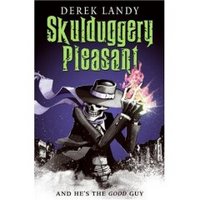
Once Skullduggery Pleasant by Derek Landy was brought to my attention by the Cybils folks, I started hearing good things about it from others, too. For good reason.
Skulduggery Pleasant is one of those books in which a young person teams up with an over-the-top in the best possible way adult character. In some of those books, the adult character overwhelms the child. One of the beauties of Skulduggery Pleasant is that the child character is easily able to hold her own with the adult. Or we should say, the sort-of adult. Maybe, former adult.
Young Stephanie Edgley runs into the very odd Skulduggery Pleasant after her uncle and his friend dies suddenly. After Skulduggery saves her from an attack by a mystery man, she learns that he is a walking, talking skeleton. He more than walks and talks. He's magical. Well, okay. I guess that goes without saying since we're talking a skeleton that gets around so well. It's the talking that's the best part about Skullduggery, anyway. He's very witty, very laid back, very smart. He's very all the good things you want to see in a heroic figure. Or all the good things I want to see in one.
Stephanie, of course, ends up drawn into Skulduggery's detective work. Fortunately, both for her and for her readers, she has a gift for it.
Two particularly interesting points about this book:
1. There are masses of fantasy writers out there and they all have to come up with a fantasy world for their fantasies. Personally, I find that kind of trying. It took me a while to work out just what kind of world Skulduggery was part of. But I must say, this particular story had a very good and logical climax.
2. This is a book with characters both girls and boys can identify with. Though the child main character is a girl, Skulduggery, back in his living days, was a man. The fact that he was an adult back then doesn't matter much because now he's a skeleton, a hip, clever male skeleton, which transcends age groups, in my humble opinion. So there's definitely somebody here for everybody.
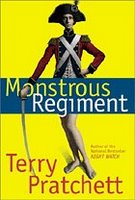
One night at dinner I described Monstrous Regiment by Terry Pratchett to a couple of family members.
"This girl wants to find her brother who had enlisted in the army so she disguises herself as a guy and enlists, too," I began.
A family member said, "That's been done."
"There's this really tough sergeant," I went on.
"That, too," he said.
"And an officer who doesn't know what he's doing."
"And that."
All of which is true. These are all elements that have been used in fiction before. It's what Pratchett does with them that's so terrific.
Monstrous Regiment is one of Pratchett's Discworld books, but you don't need much knowledge of that series to enjoy the book. (That's the difference between a series and a serial, my little lads.) I didn't totally understand the politics of the war that was being fought, but it didn't matter. What was going on in young Polly's regiment was engrossing enough that I didn't care about the bigger picture. Polly is in a regiment of brand new recruits, among them a troll, a domesticated vampire, and an Igor, which appears to be a zombie of some type. The zombies here are very adept at sewing and medicine, meaning they are a whizz at sewing body parts back on. They're even good at sewing on spare parts.
Are these "monsters" what make the regiment monstrous? Hmmm.
Polly's sergeant, Sergeant Jackrum, assures his recruits over and over that they are his little lads and he will take care of them. It appears that ol' Jackrum has been taking care of little lads for decades. Generations. This guy goes way past your run-of-the-mill screaming and spitting sergeant to become the stuff of myth and legend. At one point while I was reading the book, I wondered if he didn't have some kind of connection to hell. He should have been forced out of the army because of age long, long ago, but he's fought everywhere, knows everyone, and more than a few people owe him.
He is one incredible character, and Pratchett is always revealing something new about him.
Our lieutenant is as inept an officer as you could ever wish to find in a book, but he's saved from becoming a one-dimensional stereotype by his flashes of compassion and technical knowledge. Of course, it's not military knowledge, but you have to give a little respect to a man who knows anything at all and isn't afraid to put on a dress.
Except for the trolls, domesticated vampires, Igors, and the occasional werewolf, Monstrous Regiment reminded me of the historical fiction I enjoyed as a teenager. I read an array of hissyfic (none of it of an improving nature) but what I really liked were books about long ago young women who had adventures. The American Revolution and Civil War were good periods for girl adventures, but nothing beat the Napoleonic Wars for a time period when a young woman could find herself stumbling onto battlefields, fighting off stray soldiers, or doing a little spying.
Monstrous Regiment seemed like a takeoff of the books I was reading years ago, with a far better heroine who has no interest in ending up with a guy, the way so many of the heroines in my old books did. Oh, no. Our Polly can do way better than that.
I recently finished a historical novel from the beginning of this century written by an author whose work I was familiar with. The book was filled with one World War II cliche after another, to say nothing of a few stereotypical characters who appear in other kinds of stories. The writing was flat. It was such a chore to read it that I started skimming. Yet as I plodded along I thought I might give my copy to BDT, who's teaching sixth grade this year, for his classroom library because the book was, after all, historical fiction.
Jeezum, Gail, I said to myself. What are you thinking? That it's acceptable to encourage the young to read poorly written books simply because they include historical content? Then I began to wonder if that is exactly what is happening in the world of children's literature. I mean, over the last decade or so I've stumbled upon some less than stellar kidlit historical novels, some of them very highly regarded by others.
Take the book in question, for instance. Its child characters have no real storyline of their own. They are placed in a setting in which things happen to other, adult, characters. Three of the four dramatic moments in the book occur offstage. The first-person narrator tells us about them. In two cases, he doesn't even take part in the events. He doesn't even witness them. Another character tells him the important information (offstage) and then he tells us. Instead of being shown action we're told second-hand stories. Finally there really isn't a climax to the kids' story because they don't have a story. They're just sort of there while stuff happens to other people.
This is an award-winning book I'm talking about, and it appears to have received significant attention at the time it was published. A lot of people liked it a whole lot more than I did.
Or did they? Is it possible that the literary gatekeepers in kidlit believe that making sure children get a history lesson is far more important than the way that the history lesson is presented? And thus they are willing to turn a blind eye to stereotypical characters and situations, weak plots, flat prose, and any number of other writing flaws?
I am aware that some adult readers are so interested in the content of a book that they just don't care about how it is written. I understand and respect that. I sometimes even feel shallow for requiring more of a book than its subject matter. But child readers are never going to get a chance to decide that they prefer one kind of fiction over the other if they aren't exposed to books that include both good content and good writing.
Promoting unbalanced historical novels, books that are pretty much all history and no novel, isn't the way to do it.
I am a member of the very, very small group of readers who were not bowled over by Looking for Alaska by John Green. In fact, I may be the only reader who wasn't bowled over by it.
But it wasn't because Green is a bad writer. He is a decent writer who wrote a book I didn't care for. That is perfectly acceptable. So I decided to give his second novel, An Abundance of Katherines, a shot.
Okay, first I'm going to talk about a negative so I can end on a positive note, which will be a novelty for me.
I found the book a little gimmicky. For instance, our main character is always creating anagrams out of names. Plus, the book uses footnotes, a great many of them particularly early in the book. I will admit I've read a few novels with footnotes that I enjoyed. But here they are distracting. A little of the material in the footnotes does pertain to the main story. It could easily have been included in the text. But a lot of it is merely fun, clever stuff that pulls the reader away from the story. Green has a good story here, much more original than in Looking for Alaska, and it's entertaining. But for a long time I didn't feel any compelling need to go back to the book because I couldn't stay in the story. I was always being pulled out of it by footnotes, anagrams, or subtitles warning us that a flashback is coming.
Of course, given that mathematics has such an important place in this story, perhaps Green was trying to make his piece of fiction look like a scholarly work, complete with diagrams, subtitles, and footnotes. That is a neat idea, but it sure wreaked havoc with the narrative flow.
On the other hand, I think Green had some great material here. Colin Singleton is a former child prodigy trying to come to terms with the fact that he may not do anything particularly significant with his life. (He also wants a relationship, but who doesn't?) We're coming off a couple of decades during which many, many kids were identified not as prodigies, perhaps, but as gifted. And what does become of them when they grow up? After having been singled out throughout their schooling and working their butts off (Colin worked many hours a day from the time he was three.), are they left scratching their heads and wondering what they're supposed to do with themselves that's all that different from what their classmates who were merely smart or even average are doing? We're talking a story for our time, wouldn't you say?
In addition, the whole how am I going to live my life? thing is one of my favorite themes, and it's the major question that drives An Abundance of Katherines. The three teen characters--Colin, his best friend, the marvelous Hassan, and the girl who is not named Katherine who they meet in a general store--are concerned with how to live a good life. A good life, not the good life. Work, relationships (of varying kinds), and faith are all issues they deal with.
Whatever flaws An Abundance of Katherines may have, it is thought provoking and witty. I guess I'll be reading John Green's next book, too.
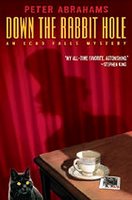
I stumbled upon a great new teen mystery series while hunting for third person novels at the library last week. Down the Rabbit Hole by Peter Abrahams bills itself as "An Echo Falls Mystery," a series about theater geek Ingrid Levin-Hill, a thirteen-year-old suburbanite who would be a mind-numbingly typical child if she didn't have a strong streak of Grampy running through her.
Ah, Grampy. Truly, truly, a beloved grandfather.
Down the Rabbit Hole involves Ingrid's accidentally becoming involved in a murder that no one knows she's involved in and her attempts to find the criminal. Of course, that's what so very many murder mysteries are about, right? Down the Rabbit Hole is a very traditional murder mystery, written around a child and her experiences, and written very well.
Voice. Ingrid has a marvelous voice. And, remember, this book is written in the third person. It's harder to do voice in the third person. Maybe it's not so much that Ingrid has a voice as perhaps the book has a tone. I think that what makes Ingrid so distinctive is that she goes her own way. Sure she's into soccer and theater the way so many kids are. She's into Sherlock Holmes the way so many book kids are. But when she goes after this stuff they seem truly distinctive to her. She doesn't seem like a cookie cutter kid.
One problem that I often have with kid mysteries and thrillers is that it never makes sense why the child detective doesn't turn to an adult for help. It just defies logic. I have never seen that issue addressed as well as it is here. Ingrid has very real and logical reasons for continuing to pursue the murderer on her own.
Characters. This book is so good, I was nearly half through it before I realized how stereotypical many of the characters are. (I'll be doing another post on that later.) But they're really good characters. There are no cartoon heavies here.
The love interest in mysteries almost always ruins the books for me. Love lines are so formulaic and tacked on to the story. The kid love interest here is one of the most believable and touching I can recall. I totally bought that kiss after those awkward, stilted telephone calls. The love interest is integrated into the plot far better than the love interests in many adult mysteries.
Plot. The plot in kid mysteries is often very weak for the obvious reason that the child detective has trouble getting around to do her crime solving. Can't drive, can't go out at night, can't do much. Abrahams, who has been nominated for an Edgar award for his adult mystery writing, does an excellent job with this. As a writer, I was reading along going, Oh, that's smooth how he got her to this house. Great how he got her there. Yes, there were a couple of points that I felt were forced and a bit unbelievable, but, quite honestly, you get that in any mystery. The bad guy might be predictable for those of us who've been reading mysteries for a long time (though I didn't catch on to the why until the very end), and the ending was a bit rushed, but the target readers should find this to be high class work.
Setting. Though Abrahams lives in Massachusetts, he's set his kid series in Connecticut. Echo Falls is an imaginary place, but the Echo Falls soccer and football teams play teams from towns in Connecticut that are real. In fact, they are right next door to me. Echo Falls is bigger than the town I live in. (We don't have a police department, for instance. We have to hope the state troopers will get here before our crimes are yesterday's news.) But a great deal of what he talks about is real for this area.
Personally, I like Ingrid Levin-Hill better than Kiki Strike because I prefer loners, or at least individuals, to posses. But the Echo Falls books do seem as if they could be companion mysteries to the Kiki Strike books. One is a classic, small town mystery, the other an urban scooby gang story.
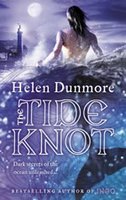
You know those sort of blog attacks that kidlit bloggers sometimes get together and do to try to bring attention to particular books and authors? Maybe they work.
Back in August, Kelly at Big A, little a did a series of "Under the Radar" posts on the Ingo books by Helen Dunmore. I happened to own a copy of the second Ingo book, The Tide Knot, which I'd been putting off reading because I didn't care for the cover, and it looked like an ocean book. I came of age in a land-locked state. I'm not exactly drawn to the sea. But Kelly's posts gave me a nudge, and I read the book a week or two ago.
The Tide Knot is one of the most calming books I can recall reading. That sounds like damning with faint praise, but by calming I don't mean dull and boring. I mean it's an atmospheric book. Otherworldly. And being pulled out of your own frantic life into another world can be calming, even if that other world involves what sounded to me very much like a tsunami.
There's a lot of nature talk in The Tide Knot. You've got your Air/ Land people, and you've got your Water/Ocean people. As often happens with fantasy books that involve nature, there's a bit of mystical mumbo jumbo, which I usually find very trying. People have land power or water power, for instance. And in a few places Dunmore teeters on the brink of giving us eco-lessons. But the writing is so very fine and elegant (and then there is that atmosphere again) that the bits I normally wouldn't have cared for just rolled off my back.
The Tide Knot is the second in a series, but I didn't have any trouble reading it. It's clear that some things have happened before the events in this particular book. Dad has disappeared, for instance. But we're brought up to speed with far less awkwardness than you usually find in serial books. In many ways, some might argue that this is a traditional broken family story, but with some twists. The twists are really good ones, though.
The Tide Knot made me think of Victory by Susan Cooper. The actual story may be familiar, but the writing is so good it doesn't matter.
I'm considering buying Ingo, the first book in the series, and after I've read it giving both books to some family members who own a summer house on the coast in Maine. I think it would be fun to keep the books at the ocean house to read when it rains or to have available for guests.
I don't think it would be all that disturbing to read about a really wicked storm when you're going to have to sleep that night right next to the sea.
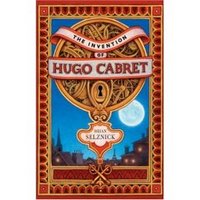
I'm usually way behind on my reading, but last night I finished The Invention of Hugo Cabret by Brian Selznick and what do I learn today? It's a finalist for this year's National Book Award for Young People's Literature. I feel so cutting edge.
J.L. Bell has already done a great deal of work describing this book over at Oz and Ends. Rather than knocking myself out going over it again, I'll just send you over there. To be short and to the point, I'll say that Hugo Cabret is a lovely book that is told through wordless pictures that lead to pages of text that lead to more wordless illustrations that lead to more text that lead to more... You get where I'm going with this.
And it's about the early days of French filmmaking! Can't think of too many kids' books on that subject.
I felt Hugo Cabret was well-written, but, except for the great historical details, the basic story seemed familiar. A pioneering genius in some field (here it is film) disappears from public view only to be rediscovered by children who bring him to the attention of the public after years of neglect. Granted, it's going to be a fresher story to a child who hasn't read as much as a grown-up. Another problem this adult reader had is that I could never get immersed in the story for any length of time. Whenever I was beginning to get into the world of 1930s Paris, I'd have to shift from reading to following the narrative through images instead of words. The jolt took me out of my reading zone. This long-time reader needed more text. Again, a child reader who isn't set in her ways probably wouldn't. She'd probably be more flexible and be able to shift back and forth much more easily than I could.
Last winter while I was at a library conference, one of the participants spoke very highly of The Invention of Hugo Cabret. She said the book worked marvelously for reluctant readers. The pages of illustration aren't just illustration. Each page carries the reader through a portion of the story--say, a chase scene. Evidently this gives gives kids who don't care for reading a break. They're still moving along, but not at that task they don't like. Books like this may encourage such children to read.
In spite of my own reading experience with Hugo Cabret, I have no problem with it being a finalist for the National Book Award. It's an innovative piece of work, and innovation isn't always rewarded. It's good to see it get some attention here.
At his website, Brian Selznick links to George Melies'A Trip to the Moon, which plays an important part in Hugo Cabret. Once the astronomers get to the moon, the movie really does become quite impressive, and it's easy to see how early filmgoers would have been taken with it. Selznick also links to a Smashing Pumpkins video that uses imagery from Melies' movies.
Going to both those sites ought to keep you busy for the next fifteen minutes or so.
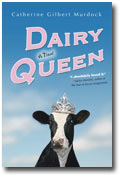
In an article in the most recent issue of The Horn Book, Roger Sutton makes a reference to "...some of today's voice-trumps-all YA novelists..." Oh, so true, so true. Some of today's YA novelists do rely very heavily on voice, and those voices often sound very much the same. How often have you seen a blurb on a YA book about "A unique new voice in YA!" only to find you're reading about another Holden Caulfield clone or a Georgia Nicholson wannabe?
D.J. Schwenk's voice in Dairy Queen by Catherine Gilbert Murdock is self-deprecating and wry. What's more, it is also the voice of a farmer from the midwest. This is not another member of a teen bitch posse or an outsider girl who is fighting that teen bitch posse. No, D.J. is busy morning and night working in the barn to keep the family farm going while her father recovers from an injury. It's hard to see how she could be further out of the school social loop as most of us know it from teen books and movies.
The book has more than a voice. It has a strong setting in the Schwenk's midwestern farm. It has powerful characters in D.J., her silent brother, her hostile yet strangely endearing father, and her mother, a farm wife with a professional job outside the home. Even Brian, who starts out as a stereotypical ugly jock, is turned around and becomes something else here. This tale of a girl who isn't worried about a date for the prom but about whether or not she is mindlessly doing just what she's supposed to do also has a strong plot. D.J. wants to strike out, and this is the story of how she does it.
Dairy Queen is a very balanced book.
It also has a romantic element. Brian, the aforementioned ugly jock, is a great looking quarterback from a rival school. Oh, he has super grades and comes from a solidly middle class family with no cows, too. There's no doubt this boy's going to college. In the traditional high school universe he is definitely superior in every way to poor D.J., who has had only one date in her life, has had to quit the basketball team, and has recently failed English. But that's the traditional high school universe. As D.J. says, the Scwenks aren't very bright and aren't much on looks, but they definitely can work. In her farm universe, which Brian is forced to enter, she knows how to get things done. She is the power figure.
In addition to being hard workers, the Schwenks know football. Brian is sent to D.J. by his football coach for training. Some readers might find that just slightly contrived, but, hey, if you're reading a book that is only slightly contrived it's your lucky day. At any rate, D.J. has trained with her older brothers, both high school football stars attending college on football scholarships. She has knowledge Brian needs. She can hold her own with him in training.
All the good looks and money and smarts that he has are balanced by her knowledge, skill, and strength. Their romance is one of equals. Their power is balanced.
The romance doesn't take over the story, either. I couldn't help but notice the contrast.
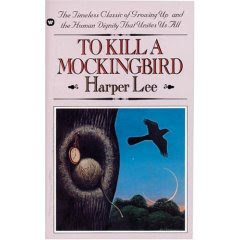 So the other day we were chatting away in our cubicles in a lull between calls, and a coworker chose that moment to reveal that she’s reading the first Bartimaeus book. Since I practically beat her over her head with that suggestion daily for about a week, I wasn’t that surprised, but I squealed in delight anyway because I love spreading the Bartimaeus love. My cubicle mate (a mother of two ten year olds) wanted to know what the coworker and I found so interesting about Stroud’s trilogy, and five minutes of incoherent fangirl babbling ensued. Though properly informed by the incident about my book rabidness, she nevertheless mentioned that she was reading a really great book too. “I saw A Wrinkle in Time series the other day at Costco and I just had to buy the whole set. I loved that book when I was in school!”
So the other day we were chatting away in our cubicles in a lull between calls, and a coworker chose that moment to reveal that she’s reading the first Bartimaeus book. Since I practically beat her over her head with that suggestion daily for about a week, I wasn’t that surprised, but I squealed in delight anyway because I love spreading the Bartimaeus love. My cubicle mate (a mother of two ten year olds) wanted to know what the coworker and I found so interesting about Stroud’s trilogy, and five minutes of incoherent fangirl babbling ensued. Though properly informed by the incident about my book rabidness, she nevertheless mentioned that she was reading a really great book too. “I saw A Wrinkle in Time series the other day at Costco and I just had to buy the whole set. I loved that book when I was in school!”
The mention of reading “in school” brought about the topic of books we all liked to read in school vs. the books we slogged through all the while silently calling our teachers evil Lit pigs unable to assign a book we’d be actually interested in.
The list went as follows: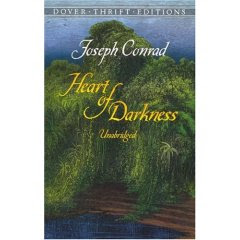
A Wrinkle in Time by Madeline L’Engle
Hatchet by Gary Paulson
To Kill a Mockingbird by Harper Lee
Heart of Darkness by Joseph Conrad (Hey, I enjoyed it.)
The Bean Trees by Barbara Kingsolver
There were a lot of other titles suggested, but for the life of me I can only remember the overlap. But it made me want to ask y’all, what books do you remember actually liking despite their designation as required reading?
What books did you despise?
Chelsea Cain is proving to be a hard woman to track down. Considering that she’s written for several papers in the area I thought for certain that she would have some sort of contact information on the internet. I’m so naïve…naïve and a little perplexed that the HeartSick site isn’t fully up and running yet.
(C’mon guys, if you’re giving away 4,000 ARCs in early June, you might want to get this up and running.)
I recently discovered that one of my coworkers works for one of the same papers she does, and I’m trying to think of the most casual way to ask him if he knows her. “Oh, you work for the ____________? Really? Do you know Chelsea Cain?” Every time I approach him though, he’s on the phone (big surprise, us being in a call center and all), and we never seem to have lunches that coincide. Curses, foiled again!
Meanwhile a friend is designing a letterhead—as well as business cards—for me to use when writing Minotaur for an ARC of my own. Going through official channels with the publicity department seems very not stalker-worthy. I mean really, what kind of book stalker tries to be all professional and business-like, I ask you? Still, since they’re hyping this book like crazy, hopefully they’ll feel I’m worthy of a copy to help keep the buzz going.
It turns out that not all publicists and publicity departments feel this way. I was emailing back and forth with another blogger, and she told me that she’s actually had publicity departments respond to her request for one title or another with, “No, we don’t want you to review book A, but we’ll send you a copy of book B which you expressed no interest in.”
Um, excuse me. You don’t want Book A reviewed? Why not? Is it that bad? Is it above being reviewed? What?
What does that say about the author and the book when the publicity department doesn’t want to take advantage of the possibility of free publicity?
I mean, maybe I’m not seeing the bigger picture here and this actually has something to do with not having enough ARCs or not wanting to just give books away to anyone, but to completely ignore a book request? If I were the author I would want some answers from my people, pronto.
Speaking of book giveaways, there are going to be some here over the next couple of weeks. All of the authors I’ve lined up interviews with have been kind enough to send me ARCs or finished versions of their upcoming books, and I like to pass those on to you. All you have to do is comment on the author’s thread or send me an email regarding the author interviewed and what you might like to see in the future and I’ll enter into a drawing for the book in question. Here’s a chance to check out a new to you author and get some fun summer reading without spending a dime.
If you’re an author interested in an interview or guest blog, you can email me as well and we’ll see what we can set up. I need to collect enough interviews and guest columns to supplement the month of July while I’m in school. I’m hoping to have enough content before I leave that I can get it all loaded into Blogger and just be able to hit post every morning. If you’re interested, email me at the email in the sidebar and we’ll see if we can set something up.
Until then, now that I’m working at a job where I sit upright (thus spurring my ability to get stuff done), I want to do more with this blog. If time restraints allow, I’d like to be get to two posts a day: one very focused on the industry like an interview or links to stories on the publishing world, and another that’s me just blabbering away. I’ve also recently agreed to write a monthly column for Romancing the Blog and to do every second Friday reviews for Paperback Reader, so here’s hoping my productivity stays strong.
So, if you want me to focus on something for this blog in between calls where I take people’s money and tell them horse stats, just drop me an email or leave a comment. I’ll take it into consideration as well as all those things I’ve started in the past but never finished. With the Belmont leg of the Triple Crown not until June I’ve got a couple of weeks to pack in the content.
Thoughts?
Amy Cohen, a marketing assistant at Gather.com, emailed me last week to let me know about the newest edition to the Gather.com First Chapters Writing Competition:
We are now in Round 3 of our First Chapters Writing Competition, and our members are voting on the 10 selected submissions who they’d like to see advance to the final round, of which there will be a total of 5. The Grand Prize Winner will get a publishing contract with Simon & Schuster! Gather members who write the most insightful comment on each of the 5 advancing submissions will win a $100 Borders gift card. And members are not limited to winning just once, so there is a chance of winning a total of $500 in Borders gift cards. For more information, please click here.
This was at the beginning of the Kentucky Derby death spiral though, so I admit that my first response was, “First Chapters wha-huh? Gather?” before my brain kicked in and I remembered the news about the Simon & Schuster/Touchstone partnership with Gather to create the “American Idol” of writing competitions back in January. (This would be after the whole Sobol Awards brouhaha, but during the height of my store closing, so I hope my forgetfulness is understandable if not forgiven.)
The research I was able to do between phone calls suggested that Gather.com was set up (at least originally) to allow writers to earn money for their work as accrue some name recognition by publishing on the web. Furthermore, the NY Times article I found said that reading is cited as a primary interest of most of the members, and readers plus writers must be a good thing, right? And hey, look! Now they were offering book money for people who took the time to really think and comment on the submissions that had made it to the third round of their contest.
Still I had a lot of questions about Gather, this money system and the First Chapters competition itself, so I zipped off a bunch of questions. Below you’ll find her response—reprinted with her permission:
Each member earns Gather Points™, which are Gather's currency for rewarding members for valuable site participation. Each Gather Point is equivalent to a frequent flyer mile. For top contributors, Gather offers a cash program instead of points. Anyone earning over $50 in points in a calendar month will have the opportunity to receive cash. Cash earners can request payments anytime they like via check or PayPal®. For more information on our Gather Earning program, please click here.
Gather is a unique place to connect with people and share your thoughts. Unlike the wide world of random blogging, Gather categorizes your thoughts by topic. Other members can easily find, enjoy, comment on, and rate your contributions. By the same token, you'll find people you deem interesting with just a keyword or two as you search. Because all content is rated on quality and popularity, it's easy to find what the community considers to be the most compelling content on any given topic.
We are a community of 225,000+ members and growing. Being part of such a community is reward enough, but you'll also get Gather Points™ just for participating on the site. Top earners may even be eligible to earn cash. Inviting new users and submitting outstanding content will earn you points. The more people you invite to join and the more valuable content you submit, the more points you acquire. Gather Points are your currency to purchase goods and services from your favorite Gather Points partners, and cash earners can request a payment at any time.
In January, we launched our first First Chapters Writing Competition where aspiring novelists had the opportunity to submit their full-length commercial fiction manuscripts for consideration. Over the course of the competition, the first three chapters of entrants’ novels were posted to the First Chapters Group for evaluation by the Gather community and Editorial team. The community and Gather Editorial team are selecting from our current semi-finalist pool of 10, five finalists through three rounds of voting. One Grand Prize Winner will be chosen for publication by a special panel of judges. For contest details, please click here. This contest has garnered a lot of great press and we will be offering similar writing competitions in the near future, so please make sure to check back at www.firstchapters.gather.com soon for details.
We truly value and appreciate our members, and to thank them for their continued participation in the First Chapters competition, we are rewarding them up to $500 in Borders Gift Cards. Simple as that!
Our most recent list of contests include:
Mother’s Day photo contest (now closed)
Mitch Albom writing competition (now closed)
Starbucks Earthwatch contest (now closed)
For more Frequently Asked Questions about Gather, please click here.
So, have any of you participated in Gather.com or the First Chapters Contest? If so, what do you think?
Do you have any questions that I can pass along to Amy?
Personally, I would like to know if Gather.com members can syndicate their feeds to other set-ups, or the feeds from other set-ups to their site. If they can be set up, how is the interest in these feeds measured to accredit the writers account?
From what I viewed of Gather (and I did spend some time surfing around between phone calls), I’ve found stuff that I’ve both liked and disliked. The use of Tags to hook your information to that of a greater community is a great idea, but by appearing at the beginning of each post they distract from the content that follows. Of course, I’m weird about layout, and anyone else might not have a problem with this.
So what do you think?

















Well, you've persuaded me -- I'm ordering my library's copy today!
Wonderful. My work is done.